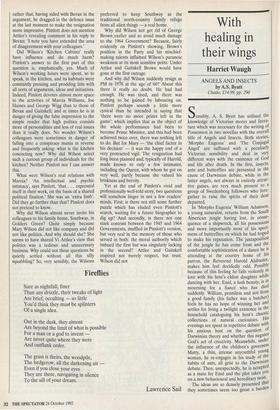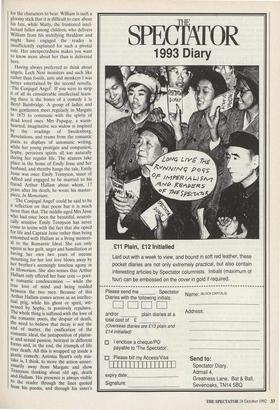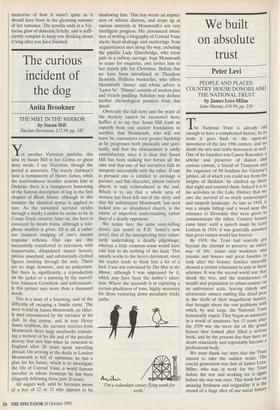With healing in their wings
Harriet Waugh
ANGELS AND INSECTS by A.S. Byatt Chatto, f14.99, pp. 290 ensibly, A. S. Byatt has utilised the knowledge of Victorian mores and litera- ture which was necessary for the writing of Possession in two novellas with the overall title of Angels and Insects. Both stories, 'Morph° Eugenia' and 'The Conjugal Angel' are suffused with a peculiarly Victorian sensibility and deal in very different ways with the existence of God and life after death. In the first, insects, ants and butterflies are presented in the cause of Darwinian debate, while in the latter angels, not always in entirely attrac- tive guises, are very much present to a group of Swedenborg followers who fore- gather to raise the spirits of their dear departed. In 'Morph° Eugenia' William Adamson, a young naturalist, returns from the South American jungle having lost, in conse- quence of a shipwreck, all his possessions and more importantly most of his speci- mens of butterflies on which he had hoped to make his reputation. The juxtaposition of the jungle he has come from and the comfortable sophistication of a dance he is attending at the country home of his patron, the Reverend Harold Alabaster, makes him feel decidedly odd. Possibly because of this feeling he falls violently .10 love with his host's eldest daughter while dancing with her. Enid, a lush beauty, is in mourning for a fiancé who has died suddenly. William, penniless and not from a good family (his father was a butcher) feels he has no hope of winning her and settles for living a twilight existence in the household cataloguing his host's chaotic collections of natural curiosities. His evenings are spent in repetitive debate with his anxious host on the question of Darwinian theory and whether this negates God's act of creativity. Meanwhile, under the influence of the children's governess Matty, a thin, intense unyouthful young woman, he re-engages in his study of the habits of ants, all grist to the Darwinian debate. Then, unexpectedly, he is accepted as a mate for Enid and the plot takes you on a new behavioural and hereditary twist. The ideas are so densely presented that they sometimes seem too great a burden for the characters to bear. William is such a gloomy stick that it is difficult to care about his fate, while Many, the frustrated intel- lectual fallen among children, who delivers William from his stultifying thraldom and might have engaged the reader is insufficiently explained for such a pivotal role. Her unexpectedness makes you want to know more about her than is delivered here.
Having always preferred to think about angels, Loch Ness monsters and such like rather than fossils, ants and monkeys I was better entertained by the second novella, 'The Conjugal Angel'. If you were to strip it of all its considerable intellectual learn- ing there is the bones of a comedy a la Beryl Bainbridge. A group of ladies and two gentlemen meet regularly in Margate in 1875 to commune with the spirits of dead loved ones. Mrs Papagay, a warm- hearted, imaginative sea widow is inspired by the readings of Swedenborg, Revelations, and reams from the romantic Poets to displays of automatic writing, while her young protegee and companion, Sophy, perceives spirits all too naturally during her regular life. The seances take Place in the home of Emily Jesse and her husband, and thereby hangs the tale. Emily Jesse was once Emily Tennyson, sister of Alfred and engaged to be married to his friend Arthur Hallam about whom, 17 years after his death, he wrote his master- piece, M Memoriam.
'The Conjugal Angel' could be said to be a reflection on that poem but it is much more than that. The middle-aged Mrs Jesse Who had once been the beautiful, neuroti- cally sensitive Emily Tennyson has never come to terms with the fact that she opted for life and Captain Jesse rather than being entombed with Hallam as a living memori- al to the Romantic Ideal. She can only Squint at her guilt, anger and humiliation at having her own two years of intense mourning for her lost love blown away by her brother's seemingly timeless agony in In Memoriam. She also senses that Arthur Hallam only offered her base coin — poet- ic romantic condescension — while the true love of mind and being resided between the two men. Because of this Arthur Hallam comes across as an intellec- tual prig, while his ghost or spirit, wit- nessed by Sophy, is positively repulsive. The whole thing is suffused with the love of the romantic poets, the despair of death,
the need to believe that decay is not the end of matter, the ossification of the romantic ideal, the juxtaposition of platon- ic and sexual passion, betrayal in different forms and, in the end, the triumph of life over death. All this is wrapped up inside a gentle comedy. Antonia Byatt's only mis- take is, I think, to move the action unnec- essarily away from Margate and show Tennyson thinking about old age, death and Hallam. His presence is always visible to the reader through the lines quoted from his poems, and through his sister's memories of how it wasn't quite as it should have been in the gleaming summer of her romance. The novella ends in a Vic- torian glow of domestic felicity, and is suffi- ciently complex to keep you thinking about it long after you have finished.




































































 Previous page
Previous page